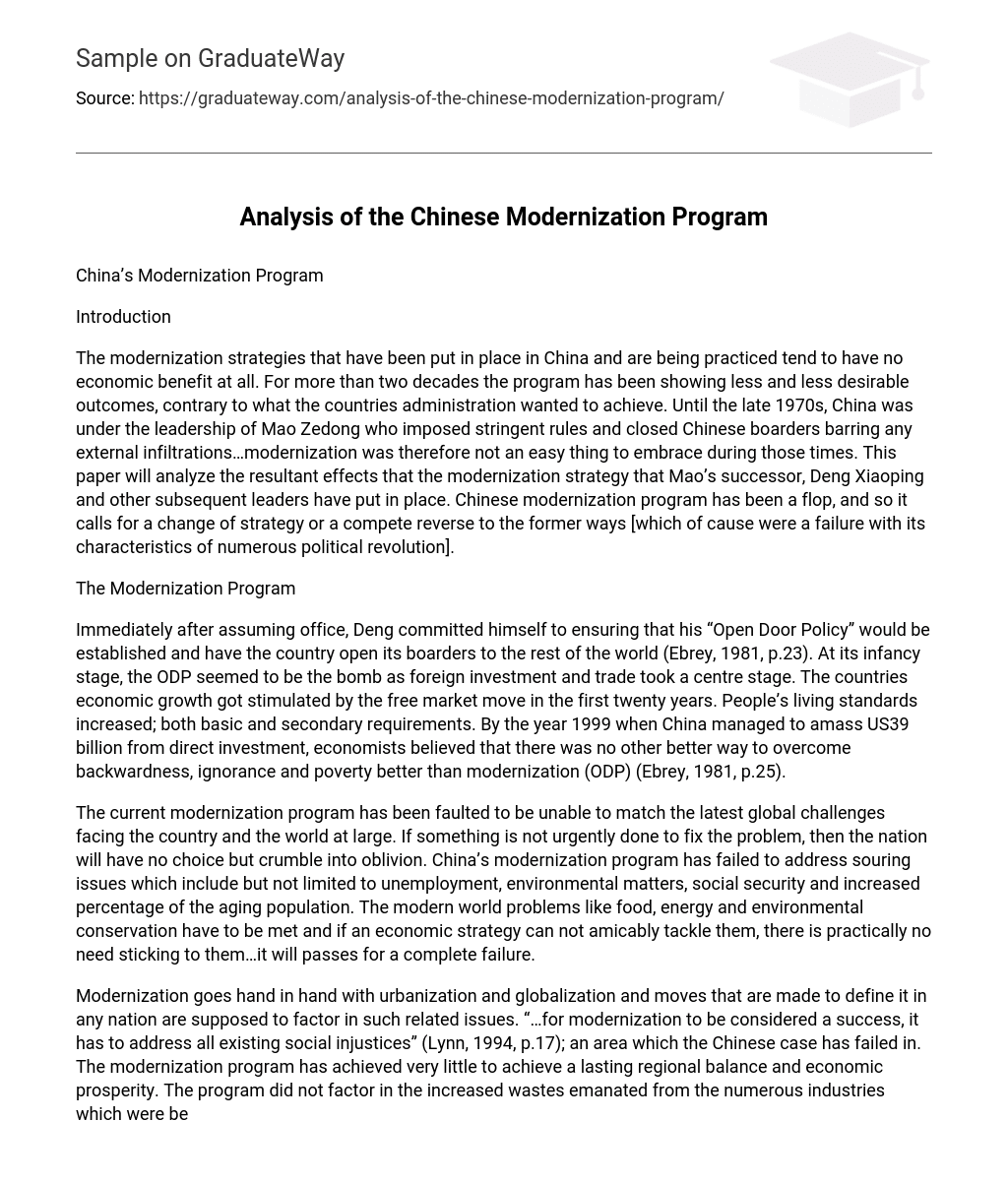Introduction
The modernization strategies that have been put in place in China and are being practiced tend to have no economic benefit at all. For more than two decades the program has been showing less and less desirable outcomes, contrary to what the countries administration wanted to achieve. Until the late 1970s, China was under the leadership of Mao Zedong who imposed stringent rules and closed Chinese boarders barring any external infiltrations…modernization was therefore not an easy thing to embrace during those times. This paper will analyze the resultant effects that the modernization strategy that Mao’s successor, Deng Xiaoping and other subsequent leaders have put in place. Chinese modernization program has been a flop, and so it calls for a change of strategy or a compete reverse to the former ways [which of cause were a failure with its characteristics of numerous political revolution].
The Modernization Program
Immediately after assuming office, Deng committed himself to ensuring that his “Open Door Policy” would be established and have the country open its boarders to the rest of the world (Ebrey, 1981, p.23). At its infancy stage, the ODP seemed to be the bomb as foreign investment and trade took a centre stage. The countries economic growth got stimulated by the free market move in the first twenty years. People’s living standards increased; both basic and secondary requirements. By the year 1999 when China managed to amass US39 billion from direct investment, economists believed that there was no other better way to overcome backwardness, ignorance and poverty better than modernization (ODP) (Ebrey, 1981, p.25).
The current modernization program has been faulted to be unable to match the latest global challenges facing the country and the world at large. If something is not urgently done to fix the problem, then the nation will have no choice but crumble into oblivion. China’s modernization program has failed to address souring issues which include but not limited to unemployment, environmental matters, social security and increased percentage of the aging population. The modern world problems like food, energy and environmental conservation have to be met and if an economic strategy can not amicably tackle them, there is practically no need sticking to them…it will passes for a complete failure.
Modernization goes hand in hand with urbanization and globalization and moves that are made to define it in any nation are supposed to factor in such related issues. “…for modernization to be considered a success, it has to address all existing social injustices” (Lynn, 1994, p.17); an area which the Chinese case has failed in. The modernization program has achieved very little to achieve a lasting regional balance and economic prosperity. The program did not factor in the increased wastes emanated from the numerous industries which were being put up in almost every town in the country at the wake of modernization. China has become industrially high yes, but accompanying this is the choke it receives from the industrial waste; the air, water bodies and the land are not spared the wrath and the program is doing little if not nothing to salvage the situation (Lynn, 1994, pp.18-19).
Conclusion
The modernization program in China was a good one at the onset as the nation got a chance to join the world market. Production cost reduced and foreign investment was boosted with the adoption of new ways of doing things. “Decentralized shifted development up to the lower level, sparking massive economic growth” (Ebrey, 1981, p.30). Ebrey points out that failure comes at the point where the policy drivers in China failed to amend changes to match the dynamic nature of the world, hence most of the policies have been rendered obsolete…the Chinese leadership is full of die hard conservatives who find it so hard to move from the usual political and economic structural ways of doing things. If this attitude persists, then the world will be certain to see Modern China revert to a Third World Status.
References
- Ebrey, P. B. (1981). Chinese Civilization and Society. The Free Press: New York. Pp.23-31.
- Lynn, R. J. (1994). The Classic of Changes. Columbia University Press: New York.p.17-19.





